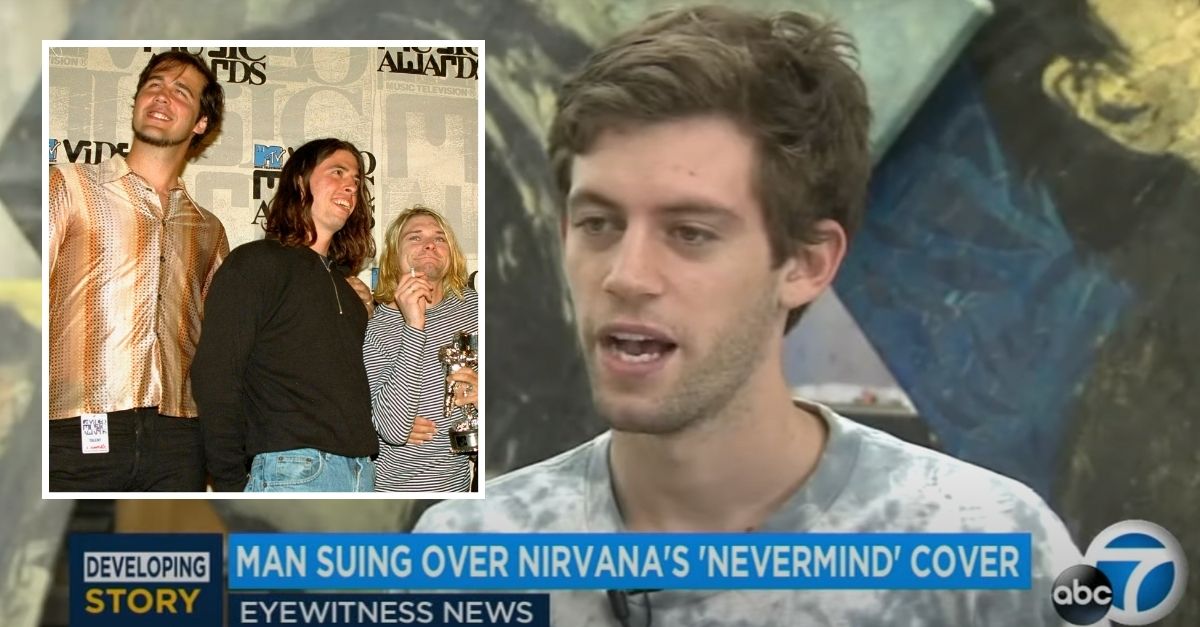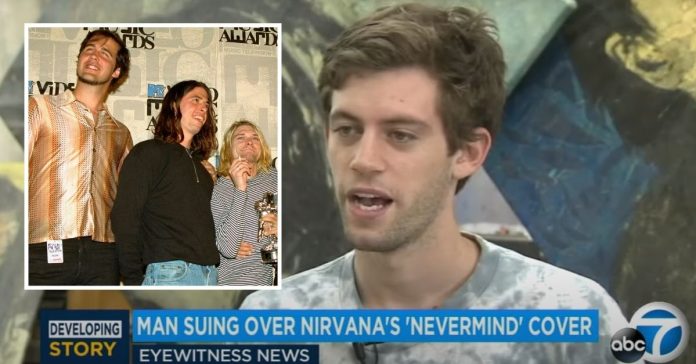
Main: Spencer Elden, the so-called “Nirvana Baby,” in 2021 (screengrab via YouTube/ABC7); Inset: Nirvana band members Krist Novoselic, from left, Dave Grohl and Kurt Cobain pose after receiving the award for best alternative video for “In Bloom” at the 10th annual MTV Video Music Awards on Sept. 2, 1993, in Universal City, Calif. (AP Photo/Mark J. Terrill, File).
A child pornography lawsuit filed by the so-called “Nirvana Baby” against the grunge superband Nirvana was resurrected by a federal appeals court on Thursday.
Spencer Elden, now 31 years old, was just a 4-month-old infant in the iconic photo used for Nirvana’s iconic 1991 album “Nevermind.” The picture showed a naked Elden chasing a $1 bill underwater. Elden recreated the well-known photo in 2016 in conjunction with the 25th anniversary of “Nevermind,” though that time with swim trunks. At the time, he remarked in a video interview, “It’d be nice to have a quarter for every person who’s seen my baby penis.”
In 2021, Elden sued Nirvana L.L.C., the estate of Kurt Cobain, Courtney Love, David Grohl, Chad Channing, Krist Novoselic, Universal Music Group, MCA Records, and other entities associated with the band in federal court alleging that he had been subjected to “commercial child sexual exploitation” by the band’s use of the “shocking” and “sexually seductive” photo. Elden said he has suffered and will continue to suffer lifelong damages from the use of the nude image and asked for $150,000 in damages.
Nirvana filed a motion to dismiss that slammed Elden’s complaint for being, “on its face, not serious.” The court filing argued that Elden spent 30 years profiting from the celebrity of having been the “Nirvana Baby.” The “Nevermind” album cover has been frequently referenced, imitated, and parodied, and is even displayed in the Museum of Modern Art. In the motion, the band pointed to Elden’s talk show appearance wearing a nude-colored unitard, his chest tattoo of the album title, and his eBay sales of autographed album covers. Nirvana told the court that Elden even used his notoriety “to try and pick up women.”
No court ever got to assess the strength of either Elden’s claim or Nirvana’s defense, though, because U.S. District Judge Fernando M. Olguin, a Barack Obama appointee, dismissed the case on Sept. 2, 2022, for being time-barred.
Elden appealed and on Thursday, a three-judge panel of the U.S. Court of Appeals for the Ninth Circuit reversed Olguin’s dismissal.
Presiding over the case were two Donald Trump appointees — U.S. Circuit Judges Bridget S. Bade and Daniel A. Bress — and George W. Bush appointee U.S. Circuit Judge Sandra S. Ikuta.
Ikuta wrote the 16-page opinion for the panel, which revived Elden’s lawsuit. The panel said that because each republication of the allegedly pornographic work may count as new personal injury, Elden’s case had been filed timely. The panel said that Elden had alleged some violations that occurred within the decade immediately preceding his filing and that therefore the case should be permitted to continue.
The judge wrote that under the applicable statute, “a complaint must be brought within ten years from the date on which the plaintiff reasonably discovers the personal injury that forms the basis for the claim.” The alleged violations started in 1991, when Eldin was a minor, and “were ongoing” according to the ruling. Further, because the album’s republication could constitute an additional injury under the statute, “Elden had ten years from the date of reasonable discovery of those injuries to file his complaint,” reasoned Ikuta.
Ikuta clarified in a footnote that the question of whether the “Nevermind” album cover meets the definition of child pornography was not part of the court’s decision. Rather, for purposes of assessing the timeliness of Elden’s filing, the court analyzed the deadline based on what Eldin alleged.
The case will now proceed through the litigation process in federal district court as the parties will move toward proving their substantive claims.
Attorneys for the parties did not immediately respond to requests for comment.
You can read the panel’s full opinion here.
Have a tip we should know? [email protected]

